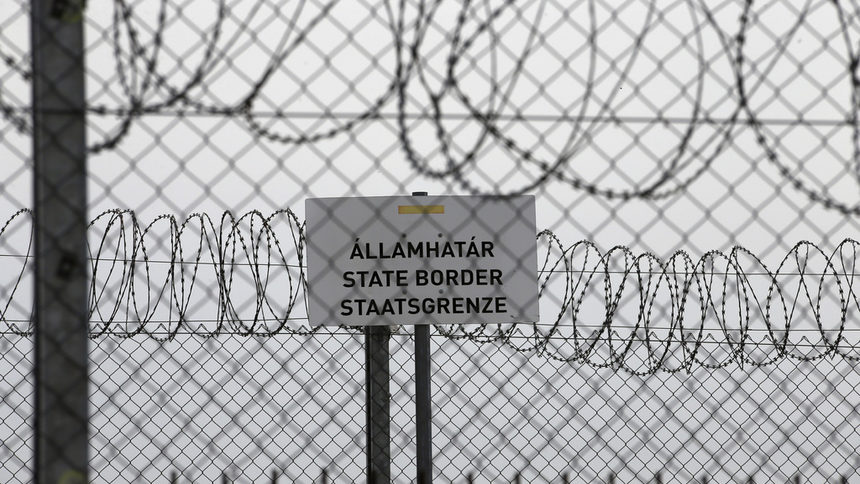The European Commission on Friday asked the EU’s Supreme Court to set a daily fine for Hungary for failing to comply with a decision on asylum rules for asylum seekers in the EU.
In December 2020, the European Court of Justice ruled that changes to Hungarian refugee law did not comply with European law, which takes precedence over national law. He ruled on a complaint from the European Commission that legislative changes made by Hungary in 2015 and 2017 deprived asylum seekers of some of their rights.
During the migration crisis, Hungary changed its national legislation by creating transit zones on the Serbian-Hungarian border, limiting places for asylum applications. In addition, the law gave the authorities the right not to apply part of the European asylum procedures in the event of a migration crisis. This prompted the European Commission to sue the Hungarian government, and senior EU magistrates ruled that the Hungarian amendments violated European law. The court ruled that the restrictions imposed made it virtually impossible to apply for asylum and that appellants of Hungarian authorities were not allowed to remain in the country until Hungarian courts issued a final decision, which was contrary to international law.
The Commission now says that 11 months after the ruling of the Court of Justice, Hungary has still not complied with several aspects of the court decision related to the possibility of applying for asylum, and has not clarified the conditions under which an asylum seeker can remain in the country while the court hears his appeal for refusal of asylum when there is no migration crisis. Following the Court’s ruling, Hungary closed the transit zones in Rioske and Tompa, but refused to comply with the remaining decisions, claiming they were unconstitutional. In February 2021, the Hungarian government took the matter to the Hungarian Constitutional Court and now insists it cannot to act before he pronounces.
In January, the European border agency Frontex announced it was suspending operations in Hungary over Budapest’s refusal to comply with a ruling by the European Court of Justice.
In a similar scenario, the European Commission has demanded a fine against Poland for refusing to comply with another ruling by the European Court of Justice on disciplinary action against magistrates. At the end of October, the court set the daily fine that Warsaw has to pay at 1m euros.
Against migration: Orban asked the EU to pay for his fence
Hungarian Prime Minister Viktor Orban has demanded that the wire fence on the border with Serbia be paid for by the European budget.
In a letter to European Commission President Ursula von der Leyen on Tuesday, he said Europe was facing an even bigger wave of migration than in 2015 and that the decision by Hungary and several other countries, including Bulgaria to raise barbed wire barriers maintains “fragile stability in the EU”.
Orban writes that Budapest has so far spent more than 590 billion forints (1.65 billion euros) from its national budget for border protection and wants them restored to the country.
“Over time, measures to protect Hungarian borders have become an example for other countries,” Orban wrote, adding that physical barriers along the border have been built or are being erected in Greece, Spain, Bulgaria, Slovenia, Estonia, Lithuania, Latvia and Poland.
According to him, fences have proven to be “not only one of the most effective types of border protection tools, but in some situations they are also essential for combating hybrid attacks.”
“All this justifies the arguments and demands for funding that Hungary has long stated,” reads the letter, circulated by the Prime Minister’s Office. The European Commission is encouraged “to do what it should have done years ago and to recognize that the protection of the external borders is an indisputable act of European solidarity and that the efforts of the Member States deserve recognition and support”.
The fence on the Hungarian-Serbian border was placed at the peak of the migration crisis in 2015.
“Hungary has decided to take full responsibility for stopping illegal migration along the European Union’s southern external border. It is now the EU’s responsibility to contribute fairly to our efforts and costs,” the Hungarian prime minister said in a letter.
Orban recalls that on October 7, interior ministers from 11 countries, including Bulgaria, requested European funding for the installation of fences at the EU’s external borders in a deliberate address to the European Commission.
The topic was discussed by European leaders in Brussels at the end of October, after which the chairman of the commission Ursula von der Leyen said that so far money for wire networks has not been given from the European budget and this will not be done in the future.
On Wednesday, a spokesman for the commission confirmed that a change in position could not be expected, although Brussels was funding more comprehensive and modern solutions for surveillance and control at the EU’s external borders with European funds such as technology infrastructure and computer systems.
“The European Commission has never funded the installation of wire fences on the European border. Our position is clear and there will be no European funding for either walls or barbed wire fences at the external borders,” the spokesman said, referring to Von der Layen ‘s statement.









